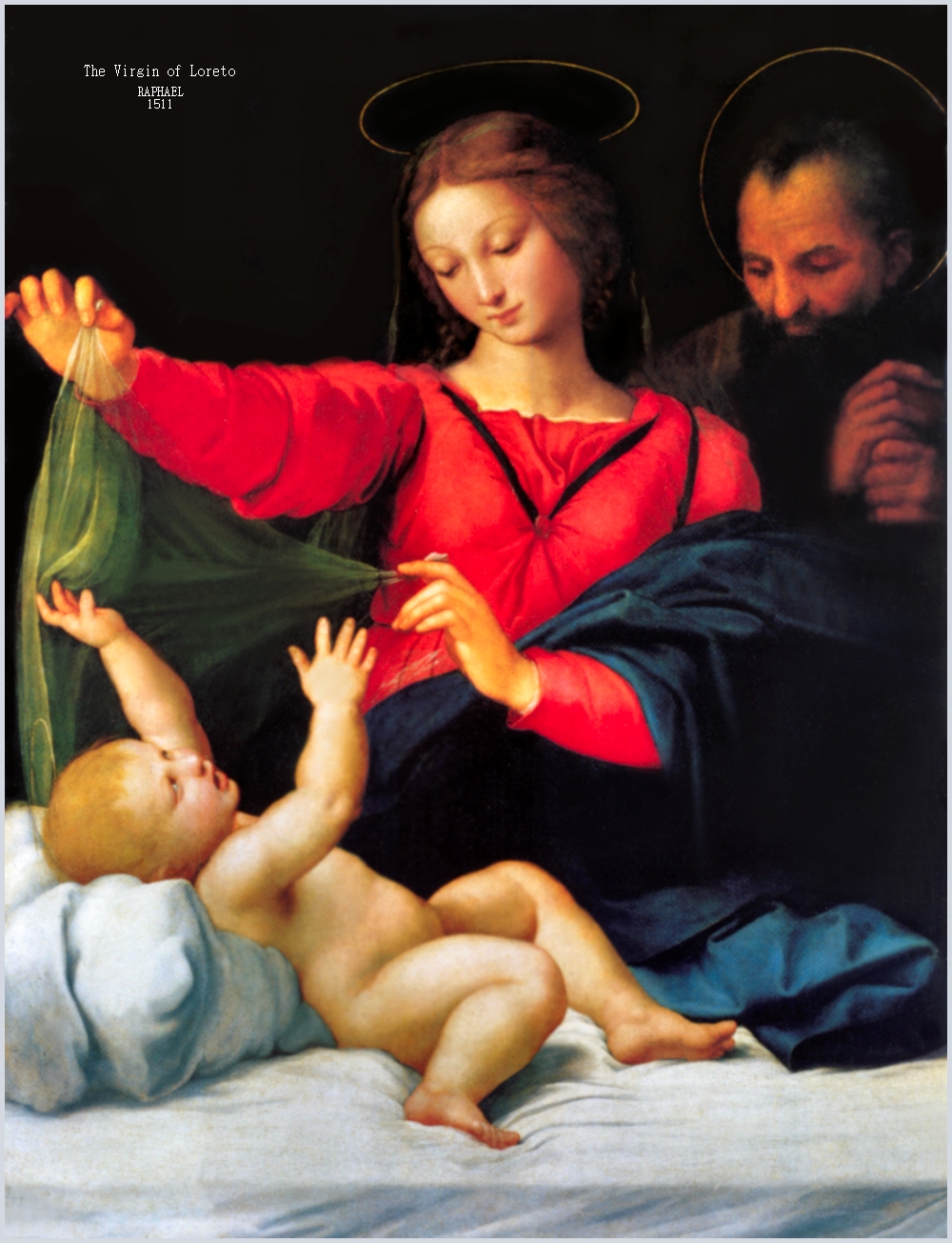
 A
Short
Reply to the Extravagant Reform Attempted by the Abbé Rolli; A devout and learned little work, by Father Ildephonsus Cardoni, of the order of Friars Minor, has lately fallen into my hands. In it the good father refutes, with much learning, a book published by the Abbé Leoluca Rolli, under the title of the New Project, &c., in which he pretends to reform the various prayers and devotions of the Catholic Church in honor of the most Blessed Virgin Mary and other Saints. For the honor of this Blessed Virgin, and out of the feeling of especial devotion which I have nourished towards her from my childhood, I have determined to give in an abbreviated form the contents of these two works, that is to say, the wicked propositions of the one, and the convincing arguments of the other.
In the first place, the Abbé Rolli, speaking of the miraculous translation by the Angels of the holy House of Loretto from Nazareth into Dalmatia, and from Dalmatia to the property of a good lady named Laureta, in the diocese of Recanati, in the march of Ancona, and thence to a hill a mile and a half distant from that property, where it is now venerated,-----the above-named Abbé calls the history of that translation 'a story which is told,' as if it was a fable; whereas the illustrious Pontiff Benedict XIV, speaking, in his beautiful work on the feasts of Mary, of this holy house, calls it 'the dwelling in which the Divine Word assumed human flesh, and which was translated by the ministry of Angels.' He then adds, that 'its authenticity is proved as well by ancient monuments and unbroken tradition as by the testimony of Sovereign Pontiffs, the common consent of the faithful, and the continual miracles which are there worked even to the present day.' In fact Tursellin, in his History of the House of Loretto, asserts that nearly all the Popes after Pius II. have spoken of its miraculous translation; and Sixtus V, in the year 1583, instituted an order under the auspices of our Blessed Lady of Loretto. Notwithstanding this, the Abbé Rolli, without reason, seems to follow in the track of Launay, Vergier, Hospinien, and other Protestants who have denied the miraculous translation, and also Theodore Beza and the Calvinist David Pareus, who call the house of Loretto 'the Lauretanian Idol.' But all these have been refuted with unanswerable evidence by many learned Catholic writers-----Canisius, Turiano, and Gretser, as Theophilus Raynaud writes. Tursellin, on the authority of grave authors, relates the miracle, which is confirmed by Peter Georgio, Jerome Angelita, and by John Bonifacio. He is referred to by Benedict XIV, who writes, that even heretics, on entering this holy house, are converted, and impose silence on those who deny the miracle. The Abbé Rolli then criticizes the titles of 'Tower of David,' 'Tower of Ivory,' and' House of Gold,' which in the litanies are bestowed on the Blessed Virgin. He calls them affected, almost ridiculous, and unmeaning. How are they unmeaning? They indeed mean a great deal; for they denote the power with which the Mother of God defends her devout servants, and the ardent charity of her blessed soul, which rendered her worthy to become the temple of the Eternal Word; as these titles are precisely explained by Saint Bernard, Saint Ephrem, Richard of Saint Lawrence, and others. Afterwards speaking of the titles, 'Mirror of Justice,' 'Refuge of Sinners,' 'Morning Star,' and 'Gate of Heaven,' he says that a Catholic hearing these titles given to the Blessed Virgin must make an act of faith, and believe that they are only applicable to Jesus Christ, and not to Mary; just as if they were prejudicial to faith. He therefore would wish all these litanies abolished, although they have been recited and sung in all churches of priests and religious for so many ages, and this with the approbation of many pontiffs; which also proves that these titles are not only not affected and ridiculous, but that they are filled with piety and tenderness toward our holy Queen, and thus excite us to greater confidence in her protection. Who can deny that these litanies, according to the established discipline of so many years, form a part of the public worship of the Church? The Abbé Rolli then takes great pains to discredit the custom which now exists of singing the Litany of Loretto when the Blessed Sacrament is exposed, and expressly calls it an abuse. In this he avails himself of the opinion of Louis Muratori, who in his book called Well-regulated Devotion does not indeed, as the Abbé Rolli does, call it an abuse, but says that it would be worth while to consider whether it might not be better on this occasion to sing prayers immediately addressed to Jesus our Savior. For my part I cannot understand how it is unbecoming to beg the Divine Mother to offer her prayers for us to Jesus, exposed in the Blessed Sacrament. Everyone knows that God has given us Jesus Christ, that we may have recourse to Him as to our chief Mediator; but Saint Bernard says that God has also given us Mary as an advocate with Jesus Christ: 'Thou desirest an advocate with Him? Have recourse to Mary; the Son will graciously hear His Mother.' In another place the same Saint adds: 'We need a mediator with Christ the Mediator, and we cannot find one more fitting than Mary.' He uses the words 'we need;' that is, another mediator with Jesus Christ is necessary; not indeed with an absolute necessity, but with a moral one, to increase our confidence; for Jesus Christ alone is our Mediator by absolute necessity. Saint Jerome, however, to take away any scruple that might arise when we have recourse to Mary, says that we must go to her, not as to the author of grace [as Calvin falsely said], but only as to an intercessor; and that for this reason we say 'Have mercy on us' to Jesus Christ; but to the Blessed Virgin and the Saints we say, 'Pray for us.' Thus did St. Jerome convince Vigilantius on this point. The Abbé Rolli is not satisfied with calling the titles, bestowed on the Blessed Virgin in the Litany of Loretto affected, almost ridiculous, and unmeaning, but he has also the boldness to attack the sacred Antiphon, 'Hail, Holy Queen,' although he knows that the Holy Church has approved it, by making its recitation in the canonical hours obligatory on all in choir. Luther had already said that this prayer was scandalous, and gave the Blessed Virgin the attributes of God. The heretic Peter Martyr also wrote, that as Jesus Christ was our only Mediator, it was injurious to Him to admit Mary as our advocate and mediatress. Our Abbé Rolli is not ashamed, in his New Project, when speaking of the' Salve Regina,' to write these words: 'Out of blind respect and party spirit the titles given to the Virgin in the "Salve Regina" are retained.' He says, moreover, that Brother Herman Contratto, whom he believes to have been its author, called the Divine Mother 'Our Hope' and 'Our Advocate' only in simple piety and devotion, since Jesus Christ alone is our only Hope and our only Advocate. It may well be said that this way of speaking differs little from what the above-quoted heretic Peter Martyr said. But since Saint Epiphanius calls the Blessed Virgin our Mediatress, which is the same thing as advocate. and Saint Ephrem calls her the hope of those who are in despair, how does the Abbé Rolli dare to assert that 'these titles are only retained out of blind respect and party spirit'? The Church, then, permits the prayer 'Salve Regina' out of blind respect and party spirit! The Abbé Rolli then leaves the litany and the 'Salve Regina,' and goes on to speak of the devotions of the scapular, Rosary, cords, and girdles of other Saints, calling them all trifling, and, so to say, useless; when, on the other hand, we know that the Sovereign Pontiffs have approved of these devotions, and enriched them with indulgences. The learned Papebroeck calls those persons wicked who deny that the Sovereign Pontiffs have approved the devotion of devoutly wearing the scapular of Mary by, many favors, and that God has approved it by many benefits. Bzovius also, and the Bollandists, speak in high terms of praise of the Rosary of Mary, which has also been greatly praised by Leo X, Saint Pius V, Gregory XIII, Sixtus V, and many other pontiffs. Of such religious devotions the learned Pouget writes: 'Those who blame them, in their ignorance blaspheme.' The Abbé Rolli next vents his fury against those Christians who practice these devotions when in a state of sin, in the hope of receiving mercy from God through their means. He exclaims, 'Such devotees are all damned.' In this, as I have already remarked, he takes Lamindus Pritanius for his master, that is Louis Muratori, who, in his book Well-regulated Devotion, says, that 'if a Christian, living at enmity with God, trusts that, on account of the confidence which he has in the Blessed Virgin, she by her intercession will not allow him to be surprised by sudden death, and that he will have time to make his peace with God, or hopes for some temporal benefit; such a hope is injurious, superstitious, and contrary to the teaching of the Church, and is wholly to be rejected.' But in this Pritanius and Rolli are in direct opposition with Cardinal Bellarmin, quoted by Benedict XIV in his Book De Festis. Cardinal Bellarmin writes, 'that devotion performed in a state of sin, if they do not justify, they at least dispose the soul to obtain justification through the merits of the Divine Mother or of other Saints.' But that which is of the greatest weight, and fully condemns them, is the doctrine of the master of theologians, Saint Thomas, who teaches that 'the devotions of the faithful, although performed in a state of sin, if they do not suffice to obtain their salvation, yet they obtain them three things: first, they accustom them to pious works; second, they obtain them temporal blessings; and third, they dispose them for the reception of Divine grace.' The same angelic doctor also teaches 'that although the prayer of a sinner is not in itself worthy of grace, nevertheless it obtains it through the pure mercy of God.' He then adds, that 'it is possible that the prayer of a sinner, even without an efficacious [that is, a firm and enduring] purpose of amendment, may be granted, out of the infinite mercy of God, provided that he is not in so obstinate a state of mind as constantly to reject every exhortation to repentance.' Pritanius also says another thing in his book. He asserts that 'when the Blessed Virgin and the Saints pray for us, they do not offer their own merits, but only the efficacy of the merits of Jesus Christ.' But in this Muratori has been fully refuted by the learned Don Constantine Gaudio, in his book entitled Defence of the Spotless Devotion, &c. [The Saint uses &c. for Etc.] The same Pritanius, in another part of his book, says, 'One reason may be alleged, which is, that our prayers will have more power when accompanied by those of the Holy Mother.' But he gives himself an inconsistent answer, and one that in no way corresponds with his learning. He says, 'This reason proves too much, and therefore proves nothing; otherwise it would never be fitting to pray to Jesus without joining to our prayer the intercession of Mary.' O God, what an answer! Then it would be unbecoming always to join to our prayers the intercession of Mary when we address ourselves to Jesus Christ? While the Council of Trent teaches 'that it is good and useful earnestly to invoke the Saints.' [Sess. 25, de Invoc. SS] But if the intercession of the Saints, and especially that of Mary, is good and useful, it is also good and useful always to obtain it. Therefore Saint Bernard advises and exhorts all to ask for graces from God, and to ask for them through Mary; for Mary's prayers to God are the prayers of a Mother, and therefore are never refused. The Saint says, 'Let us seek for grace, and seek it by Mary; for she is a Mother, and cannot ask in vain.' How strange is this! Louis Muratori, whom I have always venerated, was celebrated throughout Europe, as it appears from his beautiful life, which has been so well written by his nephew; yet in many parts of his works, as we have already seen, he does not show that piety towards the Mother of God which would have become such a soul as his. There
is no need for
me to write at greater length on the propositions above referred to.
That
which moved me to write the little I have on this subject, was that I
saw
the devout prayers and titles commonly given to Mary in her litanies
and
in the 'Salve Regina' held up to discredit: and also I heard those
devotions
of the scapular and the Rosary of Mary called trifling, which, in fact,
are so religious, and which have been dear to me from my childhood.
However,
should anyone wish to see the reform ,which the Abbé Rolli
pretended
to introduce in all these things refuted at length and fully, he can
read
the work of the Friar Minor Father Cardoni, to which I referred at the
beginning of this short treatise.
DIRECTORIES--------MARY'S INDEX--------E-MAIL www.catholictradition.org/Mary/glories16.htm |




